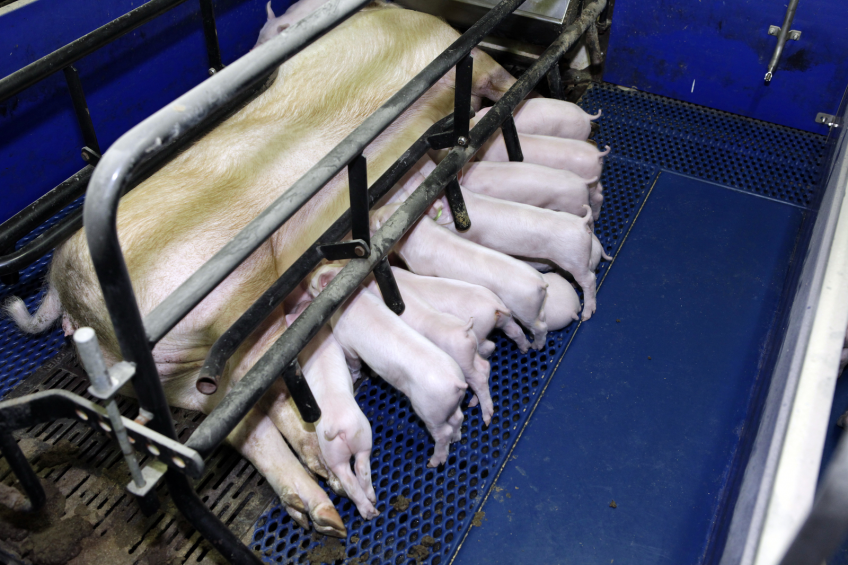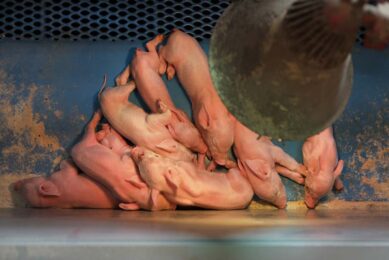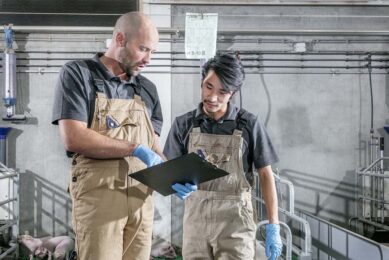Rearing systems influence piglet behaviour

Rearing environment affects piglet behavioural development which may influence response to stressful events later in life, says Joanne Stocks of the University of Nottingham.
On the website of the British Society of Animal Science (BSAS) Joanne Stocks writes: “Throughout the entire pig production cycle, the weaning of piglets is one of the most critical phases. Weaning is particularly challenging both physiologically and psychologically for piglets, and the behaviour of piglets towards their environment and each other affects their overall welfare. There are concerns within the pork industry that confinement housing using indoor farrow sheds can adversely influence social behaviour, however a new study found no differences in behaviour between outdoor and indoor-raised piglets that would highlight welfare issues.”
Outdoor-raised piglets spent more time eating and jumping against the arena walls – trying to escape
“Using a mix of Landrace, Large White and Duroc animals, researchers tested how the rearing environment influenced behavioural responses in piglets on the day that they were weaned and mixed into large groups. By using video footage they compared the behavioural responses of 30 outdoor-raised and 30 farrowing shed-raised piglets tested in an experimental arena and sequentially exposed to four challenges (each for five minutes) on the day of weaning. When held in isolation, piglets from both indoor and outdoor systems were scored as more ‘scared or worried’, while outdoor-raised piglets spent more time eating and jumping against the arena walls – trying to escape.”
Levels of aggression not different between indoor and outdoor-reared piglets
“For the second challenge, when given a plastic ball, both groups interacted with it during which they were scored as more ‘playful or curious’ than other challenges. When a food bowl was introduced in challenge three, indoor-reared piglets were more interested in playing with the food bowl itself, whereas outdoor-raised piglets spent more time eating the feed. Finally, when another piglet was introduced, there were no significant differences in social behaviour between the two groups in terms of the time taken to contact each other and the amount of time they engaged in aggressive or non-aggressive social interactions. Although piglets spent 30% of their time interacting with the other piglet and half of this time (47%) was engaged in negative interactions (pushing, biting), the levels of aggression were not different between the indoor and outdoor-reared piglets.”
Outdoor-raised piglets ate more
“The scientists from Murdoch University, Australia discovered that overall, outdoor-raised piglets ate more and were scored as more ‘calm/passive’, whereas indoor-raised piglets spent more time investigating their environment and were scored as more ‘playful or inquisitive’. Piglets raised under the indoor system demonstrated more exploratory behaviour, whereas outdoor-raised piglets spent more time trying to escape the experimental arena (jumping against the walls) and eating. Lead author Yvonne Lau reported that confinement and isolation are, therefore, likely to be more important stressors for outdoor-raised piglets, whereas an indoor environment results in a greater drive for exploration for farrowing shed-raised animals.”
Join 18,000+ subscribers
Subscribe to our newsletter to stay updated about all the need-to-know content in the pigsector, three times a week. Beheer
Beheer










 WP Admin
WP Admin  Bewerk bericht
Bewerk bericht